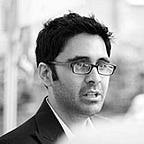What You Can Do to Fight Extremism
The Challenge of Decency
What can you do to fight the tide of extremism engulfing the world?
It’s at once the simplest and hardest thing in life.
Decrying extremism is easy. Actually not behaving in a way that spreads and legitimizes it is harder. That that is what really counts.
Just condemning extremism, without correcting your prejudices and biases, isn’t not actually being a bigot, fanatic, and so on. It just means that you are a hypocrite, too. You are a secret little extremist when you think no one is looking.
That’s exactly what the extremists count on.
Let me give you a simple example. Every pundit in the land is now angrily decrying Trump and Farage and the rest of the fascists. But they are not really acting any differently than they did yesterday, are they? Speaking is easy. Acting is hard.
If pundits really want to send a message, what could they not just say, but do? They might let a demonized minority, woman, disabled person write one of their columns, host one of their shows. Or at least quote them, cite them, elevate them. But they don’t. So now the unheard voices of suffering that should be heard get erased, not amplified. The net real world effect is exactly the same as the extremist. And the descent continues.
So what are we to conclude? When it really comes down to it, they are not against extremism. They are for the preservation of their own power. Being against extremism is not just saying it is bad. It is acting like it is unworthy.
So it is with you. You condemn Trump. But still to you Mexicans are people that do your chores. You might patronise a few, but you’d never befriend one. You condemn hate. But at work, play, love, you systematically discount people as colleagues, peers, partners that don’t feel like “one of us”. How are you any different from an extremist in practice? You are spreading extremism with your every action, thought, intention.
Saying “extremists are bad” is easy. So what? Maybe it even insulates you and lets you go on acting in biased, prejudiced ways. And then the extremist have won.
What are they really betting on? On your demons, not your angels. That in your mind, where no one can hear you, you are still really saying, “those people. I can’t trust, respect, befriend them”. And now you are not just an extremist, but a hypocrite. That is when you are truly manipulable, right? You are now foolish enough that you don’t even see yourself at all.
Extremism doesn’t get legitimised through words as much as actions. Every society calls its great crimes noble freedoms. Arbeit Macht Frei, remember? To act in an ugly way and call it beautiful is the truest ugliness. It is what really legitimises, ignites, spreads extremism.
So the question is not about what you say. The real question is one of awareness. Do you see your own biases, prejudices, judgments? The little extremist inside you? We all have one. Only when we are brave enough to see it, face it can our behavior really change. It is only through awareness that our little selves change.
Being. Not just talking. First, be aware. Being a decent person is the nemesis of extremism.
Decrying extremism is not the answer. Not being one when you think no one is looking is. That is all you need to do. And if enough of us have the strength to, then the problem will be solved without anyone having needed to solve it.
Umair
London
June 2016
